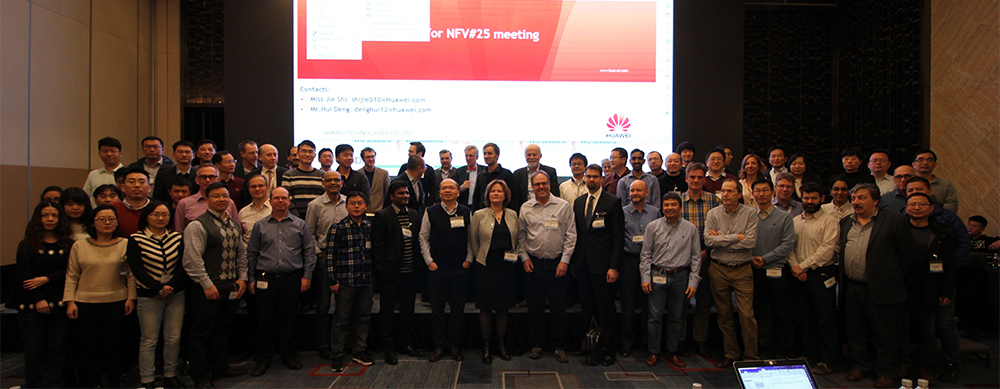NFV#25 – Strong start for the ISG in 2019 (several features ready for Release 3 drop 2)
Refreshed after the winter break and starting 2019 with renewed energy, the ISG community met for its 25th ISG plenary meeting in the sunny Beijing, hosted by Huawei Technologies.
The meeting was held in the week after the Chinese New Year, which left the cheerful spark of the celebrations over Beijing city.

Several elections were held during February and the formal appointments were made at the NFV#25 plenary. Two ISG Vice-chair positions were filled, by the re-election of Cristina Badulescu, Ericsson and Bruno Chatras, Orange for the next term. The new Security WG Chair is Alex Leadbeater, BT, a veteran in the SEC WG and the former SEC WG Vice-chair. Stefan Arntzen, Huawei, current Reliability WG Chair was re-elected and will continue for another term.
Further elections are to be scheduled for one ISG Vice-chair position and the SEC WG vice-chair.
Tetsuya Nakamura, CableLabs, did not continue in the ISG Vice-chair role, but he left his vibrant mark on the ISG. Tetsuya has driven strategic aspects for 5G and was an ETSI NFV advocate in the industry, being one of the enthusiastic ISG leaders supporting ETSI in the drafting work of the MoU with Linux Foundation.
Closing the hard work done by the working groups during 2018, several features were completed for the NFV Release 3 drop 2 and new versions of the draft normative IFA specifications were approved in the IFA WG that incorporated their completed feature MegaCRs. Among these: FEAT02 (VNF Upgrades), FEAT05 (NFV support for Slicing) and the FEAT10 (Multi-site connectivity). A major part of the FEAT10 was implemented in the new specification ETSI GS NFV-IFA 032 which is now in final draft and under ISG approval.
As usual, the latest developments and progress on the ETSI NFV Release 3 features and the specification roadmap are available and can be followed on the ETSI NFV’s feature tracking public wiki page.
Continued alignment activities with the industry translated into establishing dedicated technical drafting sessions where the rapporteur of the ETSI GS NFV-IFA 011 (VNF Package) moderates the alignment discussions on the VNFD and NSD (with stage 3 solution specified in ETSI GS NFV-SOL 001) with the comments from Linux Foundation Networking open source project ONAP. The next synchronization point with ONAP is targeted for early April.
Stage 3 work done by SOL WG had a busy face-to-face meeting week, with over 130 contributions processed. Major highlights are the completion of another cycle of Release 2 maintenance (ed261 version) for several specifications: ETSI GS NFV-SOL 002 (Ve-Vnfm REST API) ETSI GS NFV-SOL 003 (Or-Vnfm REST API), ETSI GS NFV-SOL 005 (Os-Ma-nfvo REST API), ETSI GS NFV-SOL 013 (Common aspects of RESTful MANO APIs) and ETSI GS NFV-SOL 007 (NSD file structure). A lot of work was focused on the descriptors, including the maintenance of the TOSCA-based specification (ed261 of ETSI GS NFV-SOL 001) and the completion of the YANG-based specification in ETSI GS NFV-SOL 006. The work started on the ETSI NFV-SOL014 which addresses market and deployment interoperability aspects by producing the stage 3 specification on the NFV profile for virtual resources. A new work item was approved that will provide the Specification of Patterns and Conventions for RESTful APIs in order to ensure a consistent and common design approach for all the REST APIs in ETSI NFV.
The work in security continued around the key issues related to Lawful Intercept (LI), the matters on security orchestration and its connection with the NFV-MANO framework (as part of the DGS/ NFV-IFA026 and DGS/NFV-IFA033 work items). In addition, work was done on security aspects related to packaging (DGS/NFV-SEC021), and API tokens (DGS/NFV-SEC022), addressing the security-by-design principle that has been one of the essential commitments of the ISG since it initiated its work, and bringing quite interesting and intense cross-disciplinary discussions. And, as you all could expect, blockchains have made their way into ETSI NFV, with ongoing discussions on the applicability of distributed ledgers in reliability and security matters.
The ISG agreed on a new maintenance work item that will imply some changes in the requirements to propose and perform a Proof of Concept (PoC). The updated PoC framework aims to facilitate the PoC proposals from academia, research organizations and open source communities.
Among the NFV testing activities, it is worth highlighting that an agreement was reached on general principles for the OpenAPI conformance testing in good collaboration with Specialist Task Force STF557 that is implementing the Robot code for the test framework for API Conformance testing. Test case construction is well under way, and the test cases are being validated during the Remote Plugtests currently underway. In addition, a new document was approved: ETSI GR NFV-TST 011, “Test Domain and Description Language Recommendations”.
On a related note, preparatory discussions were held on the upcoming 4th NFV Plugtests event in June 2019. The ISG community was invited to submit proposals for additional interoperability test cases to be included in the test plan, to either the TST WG or to Plugtest team (ETSI CTI). The general ETSI NFV Plugtest information is available at: www.etsi.org/nfvPlugtestsProgramme.
It was hard to leave sunny Beijing, after a week with long hours, a mild weather and great food. As of next steps, the focus for the next months is on progressing the remaining Release 3 features in development, shaping up the planning for next NFV release - Release 4 - and on completing the maintenance cycle. The ISG will meet again in May on the French Riviera in Sophia Antipolis, with a full agenda. A big thanks to our hosts and I hope we can return to China soon for another meeting.
谢谢 !
